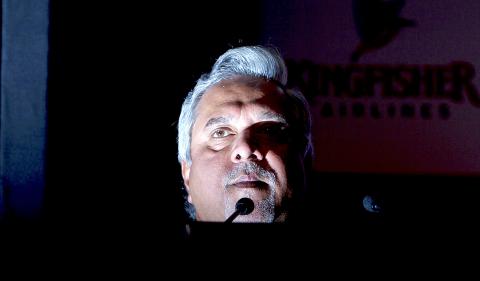Indian entrepreneur Vijay Mallya, who left the country as banks sought to recover more than US$1 billion owed by his collapsed Kingfisher Airlines Ltd, has rejected suggestions he was an absconder and said he respected the law of the land.
Mallya, a former billionaire who built his fortune on Kingfisher Beer and a current member of parliament, left India last week. More than a dozen banks — led by the country’s biggest, State Bank of India — had appealed to the Indian Supreme Court asking that he be prevented from leaving.
“I am an international businessman,” Mallya said in a series of postings on his official Twitter account yesterday. “I travel to and from India frequently. I did not flee from India and neither am I an absconder.”

Photo: Reuters
Indian media has reported that Mallya, who is a guarantor to the Kingfisher Airlines debt, is in Britain and have said that he could be staying in a luxury residence in Hertfordshire, north of London.
The businessman did not mention his location in his tweets, but said that as a member of parliament he would fully comply with the law.
Kingfisher, once India’s second-biggest airline, stopped flying in October 2012, leaving creditors, suppliers and employees unpaid. It owed banks 90.91 billion rupees (US$1.4 billion) at the end of November.
The Kingfisher creditors stepped up efforts to recover the debt after Mallya last month resigned as chairman of spirits maker United Spirits Ltd, a unit of Diageo PLC. As part of that settlement, Diageo will pay Mallya US$75 million over a five-year period.

Merida Industry Co (美利達) has seen signs of recovery in the US and European markets this year, as customers are gradually depleting their inventories, the bicycle maker told shareholders yesterday. Given robust growth in new orders at its Taiwanese factory, coupled with its subsidiaries’ improving performance, Merida said it remains confident about the bicycle market’s prospects and expects steady growth in its core business this year. CAUTION ON CHINA However, the company must handle the Chinese market with great caution, as sales of road bikes there have declined significantly, affecting its revenue and profitability, Merida said in a statement, adding that it would

RISING: Strong exports, and life insurance companies’ efforts to manage currency risks indicates the NT dollar would eventually pass the 29 level, an expert said The New Taiwan dollar yesterday rallied to its strongest in three years amid inflows to the nation’s stock market and broad-based weakness in the US dollar. Exporter sales of the US currency and a repatriation of funds from local asset managers also played a role, said two traders, who asked not to be identified as they were not authorized to speak publicly. State-owned banks were seen buying the greenback yesterday, but only at a moderate scale, the traders said. The local currency gained 0.77 percent, outperforming almost all of its Asian peers, to close at NT$29.165 per US dollar in Taipei trading yesterday. The

RECORD LOW: Global firms’ increased inventories, tariff disputes not yet impacting Taiwan and new graduates not yet entering the market contributed to the decrease Taiwan’s unemployment rate last month dropped to 3.3 percent, the lowest for the month in 25 years, as strong exports and resilient domestic demand boosted hiring across various sectors, the Directorate-General of Budget, Accounting and Statistics (DGBAS) said yesterday. After seasonal adjustments, the jobless rate eased to 3.34 percent, the best performance in 24 years, suggesting a stable labor market, although a mild increase is expected with the graduation season from this month through August, the statistics agency said. “Potential shocks from tariff disputes between the US and China have yet to affect Taiwan’s job market,” Census Department Deputy Director Tan Wen-ling

UNCERTAINTIES: The world’s biggest chip packager and tester is closely monitoring the US’ tariff policy before making any capacity adjustments, a company official said ASE Technology Holding Inc (日月光投控), the world’s biggest chip packager and tester, yesterday said it is cautiously evaluating new advanced packaging capacity expansion in the US in response to customers’ requests amid uncertainties about the US’ tariff policy. Compared with its semiconductor peers, ASE has been relatively prudent about building new capacity in the US. However, the company is adjusting its global manufacturing footprint expansion after US President Donald Trump announced “reciprocal” tariffs in April, and new import duties targeting semiconductors and other items that are vital to national security. ASE subsidiary Siliconware Precision Industries Co (SPIL, 矽品精密) is participating in Nvidia